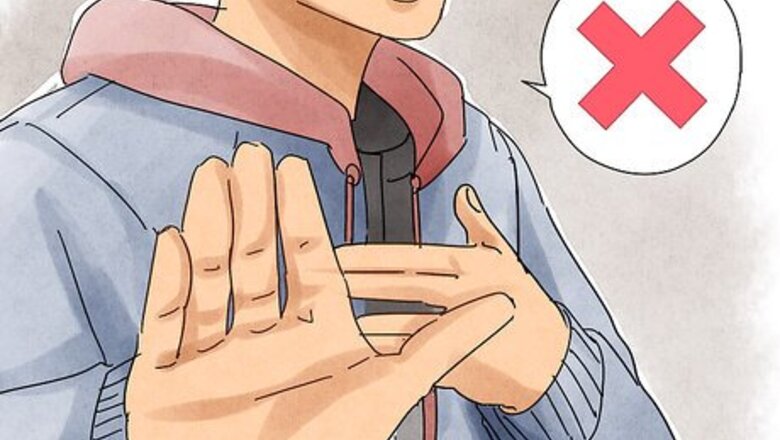
views
Dealing with Stressful Relationships
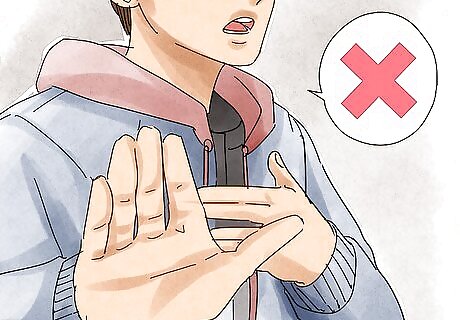
Stand up to peer pressure. Sometimes your peers will try to convince you to do something you don’t want to. For example your friends may want you to skip school, have sex, or try alcohol or drugs. Don’t let it stress you. Instead, ignore their attempts and stick to what you believe is right. For instance, if your friend wants you to go to a party where you know there will be beer, you can say, “No. I’m not going. I’m too young and that’s trouble waiting to happen.” If someone is pressuring you to have sex when you're not ready, then let them know that you aren’t interested and they need to drop the subject. You might calmly say, “I’m not doing that and, really, I’m not even talking to you about that.”

Ignore rumors about you. If someone has spread rumors about you, don’t let it get you stressed. You know the rumors aren’t true and the people who really know you and care about you won’t believe the rumors, either. Don’t waste your time getting stressed about it, just hold your head up and keep doing you. Remind yourself that you can't control what other people say and do, and if people are going to talk and gossip, there's little you can do to change that. Spending time worrying about something over which you have no control is just going to exhaust you, stress you out, and ultimately accomplish nothing. When you can, just ignore it when someone says something about the rumor. They are probably just trying to stress you. Don’t let them. If you feel you need to address it, then it’s okay to calmly explain that the rumor is not true. For example, you might say, “No, that’s just a silly rumor. I didn’t eat 12 ice cream cones.”
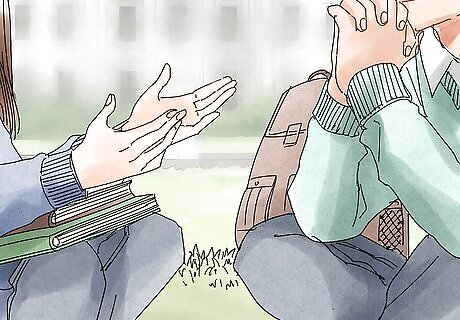
Support a friend who is in trouble. It can be hard when your friend has done something wrong, has been hurt in some way, or is hurting themselves. You can deal with this stressful situation if you support your friend and ask for help with the situation. Listen to your friend and let them know that you care and want to help them out. You might say, “I feel bad that you are going through this and I want to help you with this situation.” Even if your friend asks you not to, it will be less stressful for you and more helpful for your friend if you ask an adult you trust to help with the situation. Tell your friend, “I think we should let someone who can help us know what is going on.” You can even talk to an adult without using your friend’s name, if you need to. For example, “Mrs. Carter, can I to talk to you about a friend who’s hurting himself?”
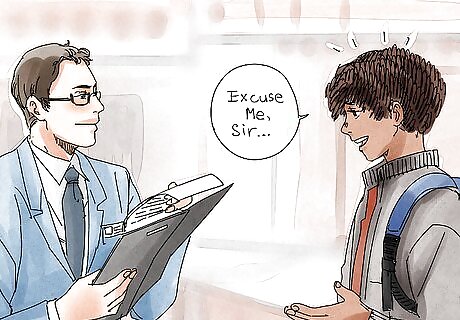
Be calm and respectful with authority figures. There will be times that your teacher, principal, or even your parents stress you out. They may be nagging you about grades, getting onto you about something you did (or didn’t do), or just being generally annoying. You may want to ignore them, walk away, or say something smart, but that will just get you in trouble. You can deal with authority figures stressing you out in school by staying calm and respectful instead. Listen to what they are saying to you. There may be something useful in what is being said. You can tell them that they are stressing you by saying something like, “I’m sorry, but this situation is really stressing me out right now.” Take a few deep breaths to calm yourself down and remember that adults are here to help you. If you need to respond to a question or explain something, then don’t interrupt, keep your tone calm, and remember to say "excuse me," "please," and "thank you." For example, if your teacher yelled at you for talking when you didn't, you could say, “Excuse me, Mrs. Peters, it wasn’t me talking.”
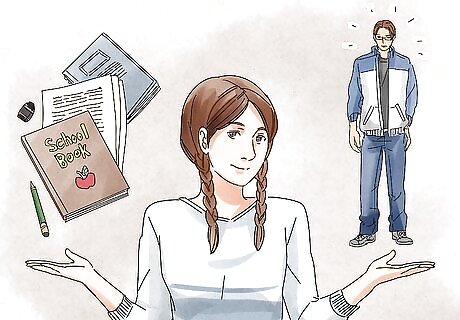
Balance school and your relationship. Although having a boyfriend or girlfriend can be fun, it can also be stressful when you are also trying to balance school. Don’t feel rushed or pressured to be in a relationship. Just take your time, focus on school, and focus on having fun when you do get into a relationship. Learn to set boundaries when in a relationship. This means defining — first for yourself, then communicating to the other person — what you are and are not willing to accept in a relationship. You can set physical boundaries (such as what you are ready to do sexually); boundaries about your time (making sure the other person knows you have softball practice on weekdays and must study afterwards, so you can only hang out on weekends); boundaries about behavior (if the person insults you or becomes abusive in any way, you will end the relationship); and so on. Make your boundaries clear to the other person. If they continually violate your boundaries or pressure you to do things you have stated you will not do, then you can feel confident that this person is not respectful and is not a very good partner. You never have to be in a relationship with someone just because they, or anyone else, wants you to. For instance, don't go out with someone you don't like just because all your friends are coupled up and you feel left out. Make sure that being in a relationship doesn’t interfere with getting your schoolwork done. Learning to prioritize is an important skill that you can practice now. While you may want to talk to the person for hours each night, ask yourself if this is really necessary. Focus on the quality of the time you spend together rather than the quantity. For instance, send a sweet, heart-felt text as opposed to spending hours texting about nothing.

Make time to socialize. Spend some time with your friends and classmates outside of school. Being around people you can talk to, who support and encourage you, will help you handle a lot of the stressful situations you deal with in school. Hang out with people that make you feel good about yourself and encourage you to be a better person. Get to school or class a little early so that you can chat a bit with your friends and classmates. Spend time with your peers doing activities or something not related to school. For example, you could meet one of your friends from class for coffee or tea, go for a bike ride together, or take a pottery class. Make sure you are socializing at the right time. During class or other quiet times is not the right time and can get you in trouble.
Coping with Other Situations
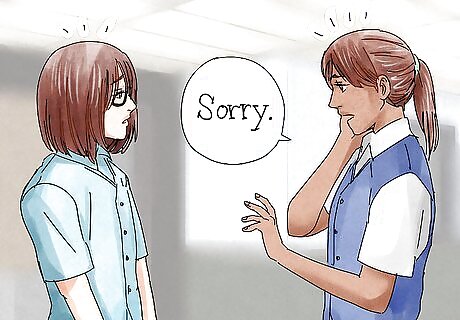
Make amends when you do something wrong. If you find yourself in trouble for doing something wrong, the best thing to do is to admit what you did and apologize for it. It will be much less stressful for you if you make amends than if you try to deny it or act rebellious. Be honest about what happened. You will feel better about not lying and your teachers and principal will respect you more. For example you might need to say, “Yes, I did cheat on my history quiz.” Apologize and try to repair any damage that may have been done by your actions. For example you might need to say, “Brandi, I’m sorry I spread that rumor. I didn’t mean to hurt your feelings.” Or, for instance, “Mrs. McEntee, I’m sorry I wrote my name on the desk. I’ll clean it off.”
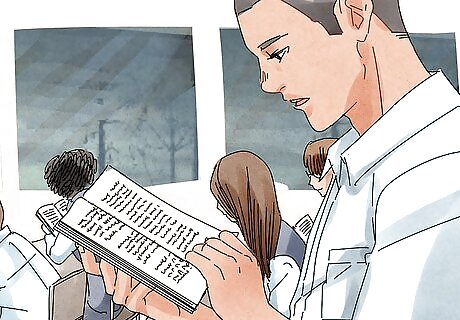
Balance work and school. If you are working and going to school at the same time you may find yourself extra stressed. You may be having difficulty getting enough sleep, getting your schoolwork done, or trouble getting to school and work on time. Taking the time to figure out how to balance work and school can save you a lot of stress. Sit down with your parents or your supervisor and create a plan for how you can work but also complete your school assignments without a lot of stress. Consider alternative ways of going to school if you have to work to support yourself. For example, explore taking online, weekend, or night classes. Be sure that you give yourself some time off from both work and school so that you don’t burn yourself out. Try to save a half hour each day for you to do something you enjoy, like read a magazine, watch a TV show, or play a game.

Talk about stress that adults are causing you. Sometimes it’s not just your schoolwork, friends, and other activities that are stressing you out. Sometimes your teachers or parents are the ones causing you stress. If an adult is doing something that makes you stressed, you should talk to someone you trust about it. If it’s a situation of typical adult nagging or being annoying, then venting to someone can make you feel better. For example, you might tell your friend, “My mom is really on my case! She said until my grades improve, I can’t hang out after school!” If an adult is doing or saying things that make you feel bad about yourself, threatened, or unsafe, you should definitely tell another adult you trust. For instance, if your coach made a sexual comment around you, you could tell your dad, “Hey, I need to talk to you about something Coach said.” Or, for example, if your mom calls you names when she gets angry, you might say to your teacher, “Can I talk to you about some things going on at home?” If your school has a counselor, try making an appointment to talk with them. They can teach you how to communicate in a productive way, how to deal with stress, or just be an ear to listen when you need to talk.
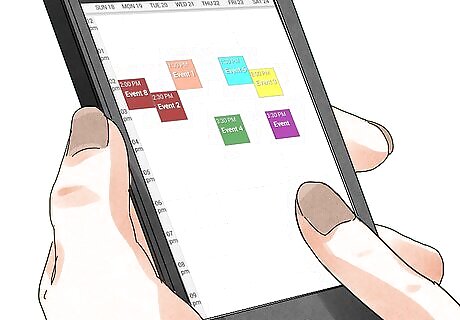
Find support. There are many people who are invested in your wellbeing and can support you when you're struggling. Parents, other family members, teachers, friends, counselors, coaches, and religious leaders are all people you can go to with your problems. Know that when you are stressed, confused, or feel alone, there is always someone who can help and support you. If your parents aren't supporting you, a grandparent, teacher, friend, or even a friend's parents may be able to pick up your parents' slack.
Handling Schoolwork
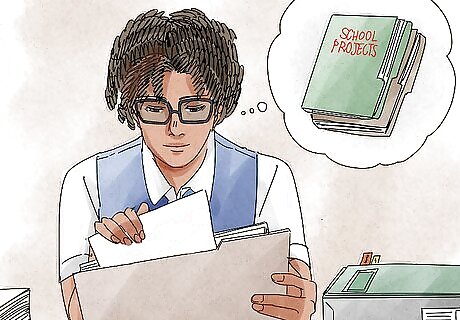
Use your time wisely. Having tons of schoolwork to do can be very stressful, especially when you have other responsibilities and obligations. Good time management may be one of the most important parts of managing it all and feeling less stressed in school. Make sure you are starting your homework early enough each day to finish it and still get a good night’s sleep. Teenagers need between eight and ten hours of sleep each night. Use an agenda, calendar, or planner to help you schedule time to work on long-term projects and reports. Pencil in due dates for each phase of the project. You can also put important dates like upcoming tests on your calendar and schedule in study time. If you have study time during the school day, then use that time for actual studying and not socializing.
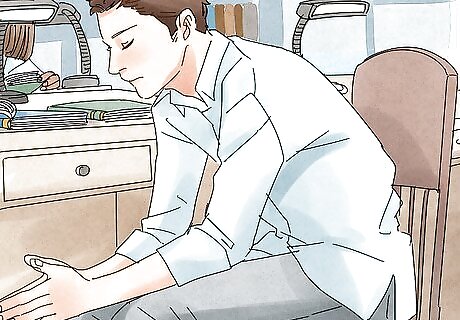
Get organized. Having the materials that you need to complete your schoolwork when you need them will reduce a lot of the stress of school. You won’t have to waste time looking for your supplies or assignments and can get straight to work when it’s time. Also, being organized will help reduce the distractions you have in your work space. Put away any supplies that you don’t need for the task at hand. Use an organizing caddy, pencil box, folders, dividers, etc. to help you organize your supplies. Organize your school papers so that everything is neat and you can find it when you need it. Label folders and use sticky notes to remind you what you need to turn in and what you need to do.

Take a short break. Sometimes a moment away from your schoolwork can recharge your brain and help you tackle the work. Even if it’s just closing your eyes for a moment or two, detaching yourself from your schoolwork can help you deal with the stress of it. If you can’t leave the room then close your eyes for a few seconds and try to clear your mind. Imagine yourself doing something you enjoy. If you can, then take a quick walk to clear your head. Even if it’s just a walk to the water fountain or restroom, it can help you deal with stressful schoolwork. Try taking a few minutes to relax before you start your homework when you get home. Also take breaks while you are completing your homework.

Prepare for tests and major assignments. Waiting until the last minute to study or write a report will only increase your stress level and possibly result in a bad grade. But if you make a plan and prepare for exams, reports, and projects before they are due, you will feel much less stressed. Break major assignments down into smaller parts and decide when you need to complete each of the smaller parts. For example, you might break a project on the Constitution down into four parts: your research, report, poster, and speech. Study for tests by reviewing one concept or idea at a time. Make sure you start studying far enough in advance to review all the material.

Ask for assistance. There may be times that your schoolwork is overwhelming you. You may not understand a concept or may have fallen behind in your work because of an illness or other situation. You can handle this stressful situation by asking for help and relying on your support system. It’s better to let your parents know that you’re having problems with your schoolwork early on. They may be able to help you with it, talk to your teacher, or even get you a tutor. You might say, “Dad, I’m having problems with my algebra. Could you help me out?” Let your teacher know when you don’t understand something or think you won’t be able to turn in an assignment on time. For instance, you could try, “Mrs. Castillo, Could you help me? I think I may need more time finishing my report.” Don’t be afraid to ask a friend or classmate to help you understand a concept. You could say, “Would you explain the water cycle to me?”
Reducing Stress in General

Try physical activity. Working out, participating in sports, and other activities that get you moving help reduce your stress overall and can help you improve or maintain your physical health. This will help you cope with the stress of school easier. Participate in a team sport as a way to be active and meet new people. Also, you might be more likely to keep it up if you know your teammates are depending on you. Try activities like walking, jogging, hiking, or biking if you prefer more solo activities. This can give you time to think and work on calming yourself.

Nurture your self-esteem. Dealing with stressful situations in school can make you feel bad about yourself or look at yourself in a negative way. In addition, worrying about how you look can stress you out. Don’t let it. Make an effort to do things that boost your self-esteem and self-image. Use positive self-talk. For example, look in the mirror and tell yourself, “I am cool and funny. I can handle school and the stressful situations of school.” Hang around people that boost your self-esteem and make you feel good about yourself. Write a list of your positive characteristics. Post it somewhere that you can see it easily and on a regular basis.
Know how to calm yourself when you are stressed. Learning to manage your emotions and self-soothe can help you deal with stress in a positive way. When you are feeling overwhelmed, you can used certain techniques to calm yourself, clear your mind, and figure out what you need to do to resolve your feelings. Some actions you can take when you are stressed include taking a break, slowing down and pacing yourself instead of rushing through something, and asking for help. Remember that nothing will change unless you do something differently. Ask yourself the following questions: What am I reacting to?; What am I really upset about?; What are other ways I could deal with this?; Am I putting too much importance on this?; Is this going to matter in six months? Ask yourself what you can change about the situation. Can you change your environment, the situation, and/or how you react? Take deep breaths when you need to calm yourself quickly. Inhale deeply so that your belly puffs out, not your chest. Hold the breath for a moment, then exhale slowly. Repeat until you start to feel calmer. Notice your "red flags." What are some signs that you are approaching stress overload? Do you eat more? Have trouble sleeping? Snap at your friends and family? Identifying these things can help you realize when you need to start using your calming and relaxation techniques.
Relax. Take some time out of your schedule and do something relaxing. This will give you a moment to clear your mind and calm your body. Do something you enjoy like playing a quick game on your phone or watching an episode of your favorite web show. Meditate for a few minutes. Try to focus on your breathing or counting. Try to let all other thoughts simply pass without dwelling on them. Call a friend or hang out with them for a little while. Do something fun that both of you enjoy like going to a movie or for ice cream.


















Comments
0 comment